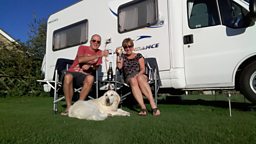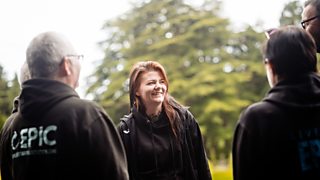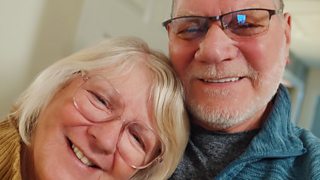I had debilitating agoraphobia – but a motorhome changed my life

Sixteen-year-old Angela Tilley was thrilled to get a job in a busy London office.
But after a year’s unwanted attention from one of her co-workers – behaviour that we would now label as stalking – she started having panic attacks on the way to work.
They became a debilitating daily occurrence, at a huge personal cost. Until one seemingly innocuous purchase made a Life Changing difference.
Angela talks to Dr Sian Williams about the joy of learning to control her agoraphobia after decades of it controlling her.
A child with 'no fear'

Angela grew up in Upminster in Essex. She was a naturally gregarious child, always on the hunt for the next adventure.
'I would hop around on the London Underground at age 12 or 13'
“I would hop around on the London Underground at age 12 or 13,” she recalls, “no fear in the world.”
After passing her driving test, she would embark on road trips to Devon or the Isle of Wight. “I was very independent, always,” she states.
At 16, Angela left school and started working in a big office in London. She was excited to start adult life, and accrue funds to travel.
“I couldn't wait to earn my own money, start having more adventures, going abroad.”
Pretty soon, however, Angela became the focus of unwanted attention, from a co-worker mentoring her in her first role.
“He was someone that I just saw as a work colleague,” she says. “There was no romantic thoughts between us, so I thought. Until a few months into my job I started coming in to poems, presents, letters – and that's how it kind of all started.”
'Relentless' harassment
Despite Angela’s polite rebuffs, the man began turning up at the home Angela shared with her parents. They did not get involved.
'He would threaten to... crash his motorbike'
“They thought I was very independent,” she remarks. “That I was handling things.”
But the colleague’s behaviour became increasingly alarming: “He would threaten to commit suicide, crash his motorbike on his way home if I didn't see him in a romantic way,” Angela states.
If he saw her with her then boyfriend, he would “start bashing his head on a wall.”
At work, it was not taken seriously: “The fellows I'd work with would quite often deliberately come over and put their arm around me or something just to provoke him and to see his reaction.”
“It was relentless,” she admits. He even wrote a book: a “semi-pornographic” story about an office affair, that he would leave on her desk.
The harassment went on for over a year. Then, finally, the penny dropped: she was not going to change her mind.
Angela’s harasser got a transfer out of the department and the stalking behaviour stopped. “The initial feeling was just probably euphoria,” she states.
'Feeling overwhelmingly trapped'

Not long after the harassment ended, Angela had her first panic attack on the train on the way to work.
"I just thought I was perhaps going mad"
It manifested as an “overwhelming bodily feeling” and a sense of being trapped.
“I've always in my head described it as like a feeling of hot and cold liquid nitrogen going from my head to my toes, and to my arms and to my legs,” Angela explains.
Her heart would race; her stomach churn.
She was tortured by worries: “Am I going to faint? Am I going to have a heart attack? Am I going to make a complete fool of myself in front of all of these people?”
“It started happening regularly,” she recalls. “I didn't know they were called panic attacks. I just thought I was perhaps going mad.”
It was not only affecting her commute: “I would go to the local supermarket, stand in a queue and start feeling overwhelmingly trapped, even though my logical brain told me I can just go home,” she explains.
In her car, sat at traffic lights, the same fear would overwhelm her.
After being stuck in a tunnel on the Central line, she stopped using the tube. She would frequently get off the overground trains too.
“I was running away from wherever I was having a panic attack,” she states. But the fear would follow her.
“The feelings that I had endured during that year of being the focus of unwanted attention had clearly made me feel really, really trapped,” she explains.
At the time she had coped; this was the aftermath.
Diagnosed with agoraphobia

Angela’s panic attacks were now daily - but she was determined to hide it from everyone in her life.
“I have been very, very close to being inside those four walls and not coming out again"
“I couldn't share it, I was embarrassed about it, I was ashamed of it… and so I was running my life feeling very isolated.”
“The very first person I ever actually told, because I just thought I must be going mad, was my GP.”
Angela’s doctor quickly diagnosed her with agoraphobia. His advice was to terminate her job in exchange for something local.
“I knew in my heart that that would just be about the worst thing I could do,” she says. “My world was already shrinking.”
Somehow, she continued working in London for another six years.
At 21, she got married to someone she had met at work, but the wedding "was a huge dread rather than a joy,” she admits.
“I just made sure that everything we did was local, including our honeymoon, which was to an Essex seaside town.”
Angela did everything she could to overcome her agoraphobia: she tried hypnotherapy and counselling; she saw psychologists, read books. She would repeat the mantra: “Feel the fear and do it anyway.”
“I just knew I had to challenge it at every point, even though those challenges were so great and so difficult,” she says.
“The more I challenged it, the more I could do. But each challenge was like climbing a mountain.”
“I have been very, very close to being inside those four walls and not coming out again,” she admits.
'Desperate' to hide it
Angela went on to have two daughters, but concealed her agoraphobia from them.
"Letting my children down was my biggest fear"
"Letting my children down was my biggest fear," she says.
“I was so desperate that they didn't know, that they wouldn't follow in my footsteps, that they wouldn't become phobic themselves through learnt behaviour,” she says.
She would force herself to go on holidays, locally, but it was her "very supportive" former husband and parents who would take the children on day trips to London.
“I always had a reason why I couldn't go", she says.
It was only when they became teenagers that she began to reveal the truth.
Her third husband, Simon, has been a huge source of support.
They met online 20 years ago, and for the first few dates, Angela hid her affliction.
“I never wanted to be defined by agoraphobia,” she says, “but finally, I'd got myself into a position where I was extremely keen on him and the feelings were being reciprocated. And I knew I had to do the big reveal.”
She was nervous but “he was just brilliant.”
With Simon, she always knew that, whatever they were doing, she only had to say the word and she could retreat to her safe place. “Because of that, I never had to.”
A life-changing idea

By 2015 Angela was managing to work and spend time with her family, but her life was still limited.
"Being a snail and carrying my home on my back might actually be quite a good thing"
“Our main holiday every year was 50 miles away, and that was like my boundary,” she explains.
They would borrow her parents’ caravan and, although they would not go far, enjoyed the lifestyle.
They had a mutual envy of the holidaymakers with motorhomes. Then it dawned on Angela: “Being a snail and carrying my home on my back might actually be quite a good thing.”
And so, on a whim, they stopped in at a dealership. “There we fell in love with a little motorhome and we decided to buy it,” she recounts.
Their first trip was not smooth sailing – Angela’s anxieties had not evaporated – but she began to see the light: “If I needed to go back into the motorhome to make myself a cup of tea, I could just do that.”
“On the times that I felt calm I just loved every second of it,” she says, “and when I felt happy, I felt deliriously happy.”
'It opened up my life'
Angela’s life began to expand. She drew a map tracking their trips: in the first year their outings were all within a 50-mile radius of home; in the second year, that distance grew.
"[I] focus on the things I can do rather than... the things I can't"
Then in 2018 they upgraded their motorhome and embarked on their first European adventure – something Angela had never believed possible.
“It opened up my life,” she states. “The more I challenged the big stuff the better the smaller challenges in my life became.”
“I can't do everything,” she admits, “but I try to put my focus on the things I can do rather than put all the focus on the things I can't...
"For many years my agoraphobia completely controlled me and I think I've reached a stage where, for a large degree, I now control it.”
Angela has four grandchildren under four. She takes them to the seaside, and is finally able to enjoy doing “all the normal family things you can do with your children.”
“I feel like I’m kind of reliving some of my youth.”

-
![]()
Listen to The Great Escape episode of Life Changing
Angela Tilley explains how a life-changing purchase helped her overcome agoraphobia
More from Life Changing
-
![]()
Life Changing: I saved 30 people from a sinking ship – but I can’t swim
Lorry driver Larry O’Brien explains how he saved over 30 people from a sinking ferry.
-
![]()
Life Changing: I won £50,000 then gambled it away in seven days
When Stacey Goodwin got a new job, it triggered a destructive gambling addiction.
-
![]()
Life Changing: I was shot in the face and blinded - but stayed positive
Ed Stewart went blind after being shot, but a new - albeit risky operation - offered hope.
-
![]()
Life Changing: The childhood love that survived a 45-year hiatus
How it would take four decades for two children's home friends to find each other again.





